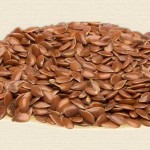 Flaxseed is something that many of us add to our food daily for its ability to give us omega-3 fatty acid, but is there something we should know about this widely used seed beyond its golden color.
Flaxseed is something that many of us add to our food daily for its ability to give us omega-3 fatty acid, but is there something we should know about this widely used seed beyond its golden color.
Rancidity Of Seeds
All seeds have to deal with going rancid sometime in their life. Before we get into how this affects flaxseeds lets understand what “going rancid” means. Most of the time people apply this to an undesirable order or flavor of oils. If you keep most oils long enough they will develop a rancid smell. To get a sample of that smell go by a fast food restaurant, you can smell the rancid oils from the parking lot when their oils are at the end of their useful period. Usually “going rancid” means smelling bad, but this is not always the case.
Oils can also develop microbial rancidity or oxidative rancidity. Microbial rancidity happens when the micro-organisms in the oil break down the structure of the oil and produce odors and flavors we dislike. Often we miss this type of rancidity because it is not quickly noticed in its beginning stages and the oil or seeds are consumed. Oxidative rancidity is what most of us are familiar with and is when oils go rancid from their exposure to air. Again, we often consume the oils before they have gotten to their tipping point of being so rancid we just can’t help but notice. Heat helps to accelerate both of these types of rancidity.
Manufacturing Affects Rancidity
In the store flaxseed oil is kept refrigerated to slow down the issues with heat influenced rancidity. What about heat during the manufacturing or extraction of that oil? The manufacturer tell us that the oil is “cold pressed” so we assume no heat is involved. In reality temperatures can reach between 150-200 degrees Fahrenheit in the expelling process as a great deal of force is required to press the oil from the seed. At these temperatures the omega 3 fats are definitely damaged. The only requirement to use the words “cold pressed” are that no external heat source is used in the extraction process. Now I have seen some quality control videos showing personal monitoring of the process and stopping the presses if temperatures go above 118 degrees. This is great for the end product, but will slow production down and increase costs. I guess the question is at what temperature does each manufacturer decide what they will call “cold pressed”?
Practical Tips
The quality of the flaxseed oil is very important and we understand how heat can make our expensive product worthless. Check with the manufacturer and ask what temperature they allow the expeller process to operate at. Buy your flaxseed oil from stores that quickly stock the product and keep a rolling inventory. You don’t want to buy an oil that has been sitting on the shelf for a long tine. When you are transporting the oil home it may be wise to use a cooler to insure cold temperatures.
Another suggestion it to look at buying flaxseed whole and grinding it the day you will use it. This can go a long way to insure the non-rancidity of your product. Do understand that ground flaxseed will go rancid very quickly, sometimes in as little as a week. This brings into question the quality of any pre-ground flaxseed you can buy.
One last option is to opt for another seed to get your omega 3 fats. Chia seeds are much easier to store as they contain such high levels of antioxidants that they protect their oils from going rancid very well. Chia and flaxseed contain almost the same amount of omega 3 fats so there is no loss there. Let me mention that Chia contains almost twice the dietary fiber as flaxseeds. See, Chia – More Than Fun…A Truly Functional Superfood.
Source:
Obermeyer, W. R.; Musser, S. M.; Betz, J. M.; Casey, R. E.; Pohland, A. E., and Page, S. W. Chemical studies of phytoestrogens and related compounds in dietary supplements: flax and chaparral. Proc Soc Exp Biol Med. 1995 Jan; 208(1):6-12.




Speak Your Mind